The Chagos Islands Deal: The view from America
A changing of the guard in Washington has major implications for the future of the British Indian Ocean Territory.
NEWS FROM THE OVERSEAS TERRITORIESRESEARCHBRITISH INDIAN OCEAN TERRITORY
A changing of the guard in Washington has major implications for the future of the British Indian Ocean Territory.
The Biden Administration
When the United Kingdom (UK) Foreign, Commonwealth and Development Office first announced its plans to transfer the sovereignty of the Chagos Islands to Mauritius last October, the outgoing Biden administration praised the agreement for overcoming ‘long standing historical challenges’ to achieve ‘mutually beneficial outcomes’. However, as the Telegraph later revealed, the United States had not merely been an interested observer during the negotiation process. Rather, officials from the State Department warned the UK Government that failure to secure a deal with Mauritius before the US election risked jeopardising the ‘special relationship’ between the two nations.
Whilst the United States (US) rightly has a major interest in securing the base on Diego Garcia, the danger of basing decisions about the future of British Overseas Territories on the whims of the current administration in Washington also carries considerable risk. The hazards of this strategy were laid bare on the 5th of November, with the Democrats defeated by a Republican Party with a radically different foreign policy agenda. Within under a month of taking office, the Trump administration has already made several moves that have broken significantly with the precedents set during Biden’s time in the Oval Office. Whilst Starmer’s government attempts to press on with the handover, it appears increasingly likely that handing over the territory risks alienating rather than appeasing the Americans.
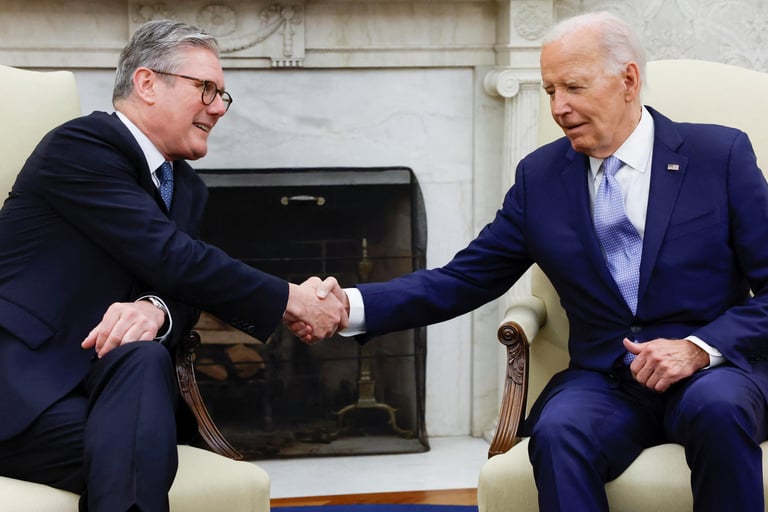

UK Prime Minister Keir Starmer and former US President Joe Biden
The US connection
The base on Diego Garcia is located in a strategically crucial location in the Indian Ocean, with the airbase representing one of only two US strategic bomber bases in the Indo-Pacific region. In addition to the B-1, B-2 and B-52 bombers operating from the island, the US also maintains a satellite control network and a naval support facility on Diego Garcia. Whilst the US’ continued access to the base is assured whilst the Chagos Islands remain under British control, transferring the islands to Mauritius poses two major threats. The first issue is that major powers opposed to the presence of a US base in the Indian Ocean could apply diplomatic pressure on Mauritius in an effort to get them to either cancel the lease on the island, or refuse to extend it. The second threat was highlighted by Commander (retired) Adam Peters, who served as the Royal Navy’s commander of Diego Garcia between 2001 and 2003. In Peters’ view, rival powers such as China could establish listening stations on the outer islands in the archipelago, or even install anti-aircraft weaponry capable of shooting down US planes operating from the airbase. Consequently, the future of the islands is of vital importance to both US and UK national security interests.
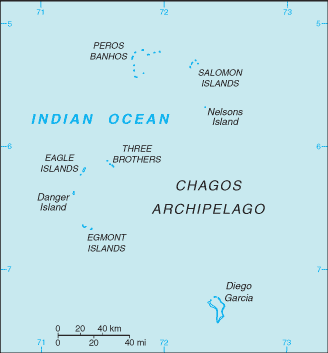

A map of the Chagos Islands
The Republican Party reaction
Senator John Kennedy
Within the Republican Party, some of the strongest criticism of the deal has come from Louisiana Senator and member of the Senate Judiciary Committee, John Kennedy. On the 23rd of October, Kennedy released a lengthy video statement on X condemning the Biden administration for ‘undermining America’s security interests’ by approving the transfer of sovereignty. In the clip, he argued that the ‘very important military base’ risked being handed over to a country that was vulnerable to ‘pressure from China’, and stated that he felt ‘very disappointed’ in the UK for bowing to diplomatic pressure. In a subsequent post on the 16th of January, Kennedy reiterated his belief that any transfer would ‘jeopardize national security’. Finally, on the 27th of January, Kennedy made his most substantial intervention in a series of statements released on the social media platform, which were subsequently picked up by Elon Musk.
Kennedy highlighted the risk that the base on Diego Garcia could fall victim to both Chinese and Iranian espionage if the UK surrendered control of the archipelago to Mauritius, whilst also stressing the opposition to the deal from many Chagossians, and highlighting recent statements by UK-based group Chagossian Voices. Concluding the thread, he contended that ‘the Chagossian, American and British people would all be safer if this deal with Mauritius found its way into the shredder for good’. Though Kennedy is a relative newcomer to the Senate, he has already built a reputation as an authority on foreign policy matters in the Republican Party, playing a major role in efforts to sanction the Assad regime for its use of chemical weapons during the Syrian Civil War, encouraging American aid to Ukraine and investigations into Chinese espionage in the United States. Consequently, his opposition to the deal will have strongly resonated with many in the Republican Party, especially given his warm relationship with President Trump.
Following his social media post, he wrote an article in the Daily Telegraph against the handover and has been mobilising his networks in the US against the deal as well as speaking openly in the Senate against it.
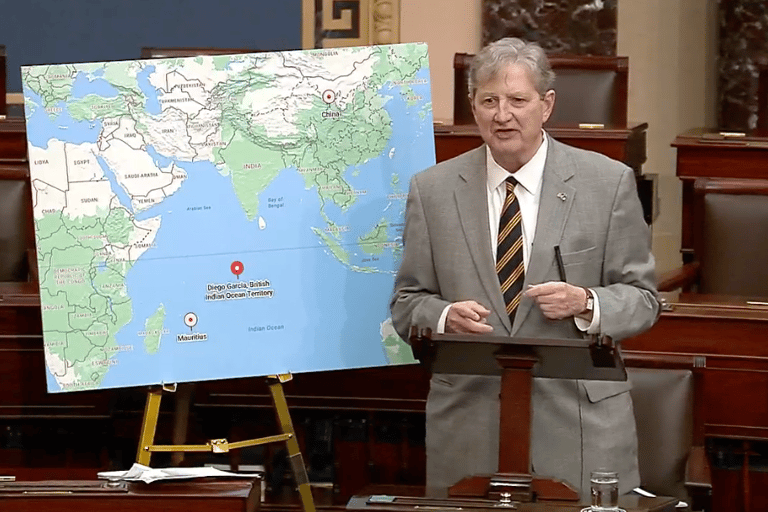

Senator John Kennedy speaking against the deal on the floor of the US Senate
Elon Musk
Elon Musk has become one of Trump’s closest aids, his words have become hugely influential since taking over platform X. The British government has been watching closely his constant commentary of the UK Prime Minister and have been trying to avoid confrontation with the Trump Administration.
Days before the inauguration, and a potential signing between the UK and Mauritius, Elon Musk picked up on Senator John Kennedy’s warning about the imminent signing of the deal and lightly supported his tweet which took Kennedy’s comment into the realm of 33 million views. This inturn woke the US up into the issue facing the new President’s Administration.
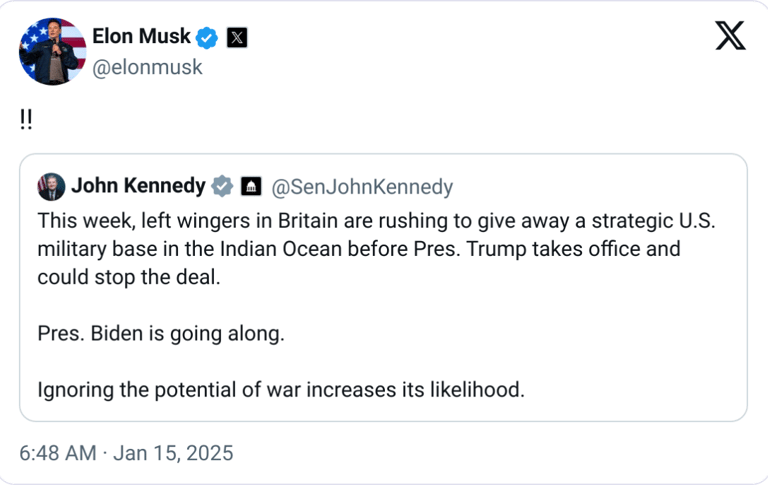

Elon Musk reposting Senator John Kennedy's warning
Secretary of State Marco Rubio
The newly appointed US Secretary of State, Marco Rubio, reportedly expressed major concerns over the deal. Although the UK Government has already sent several delegations to Washington in an effort to soothe the new administration’s unease at the transfer of sovereignty, these missions do not appear to have won the Americans over.
In a second call between Lammy and Rubio, the Secretary of State again highlighted the risks that the deal could pose to security in the region which was omitted in the FCDO readout but was later disclosed by witnesses. The matter is expected to be brought up again at the upcoming Munich Security Conference on the 14th of February where Secretary Rubio will meet his counterpart David Lammy face to face.
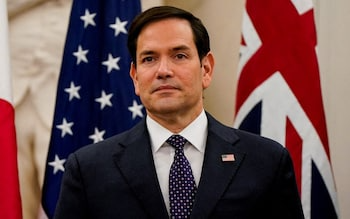

US Secretary of State Marco Rubio
Former White House Chief Strategist, Steve Bannon
A recent interview with Steve Bannon, aired on GB News, offered his perspective on what the discussions likely involved between Rubio and Lammy’s first phone call. In Bannon’s view, Rubio has either already informed Lammy that the deal is a ‘non-starter’, or will do so in the coming weeks. The former White House Chief Strategist noted that he was ‘stunned’ that the deal had not been killed sooner, claiming that there was ‘no logic’ behind it.
Further, Bannon highlighted the potential for opposition to the deal to bring together both sides of the Republican foreign policy divide, with both ‘isolationists’ and ‘hawks’ seeing the Diego Garcia base as a crucial component of US national security. Consequently, with widespread Republican opposition appearing likely, the chances that the current deal will bolster the ‘special relationship’ seem remote.
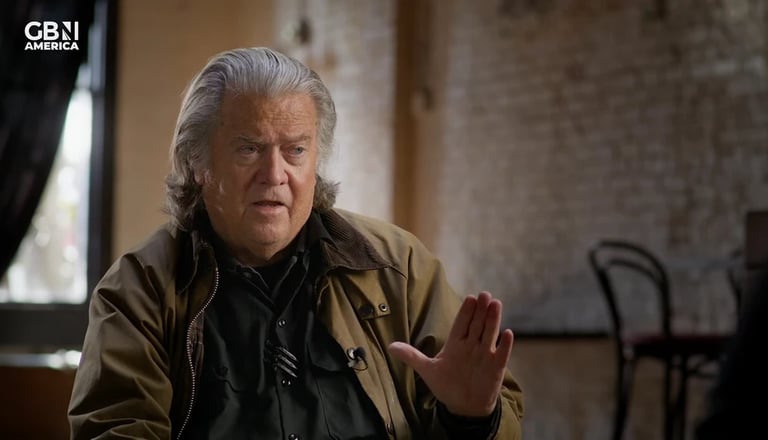

Steve Bannon in an interview with GB News America
President Trump
The President ultimately holds the key to either ending the entire deal or altering it. It’s impossible to predict currently which way he will go. He could end up making an offer on behalf of the US to buy sovereignty.
In the coming weeks the UK National Security Adviser Jonathan Powell, who negotiated the deal, will meet his counterpart in a last-ditch attempt to persuade the US. The result of this meeting will likely be delivered by Marco Rubio at the Munich Security Conference and backed-up by the President in a call to the UK Prime Minister.
Will the President make a public announcement and deliver decisive action to crush or make a deal? Time will tell.
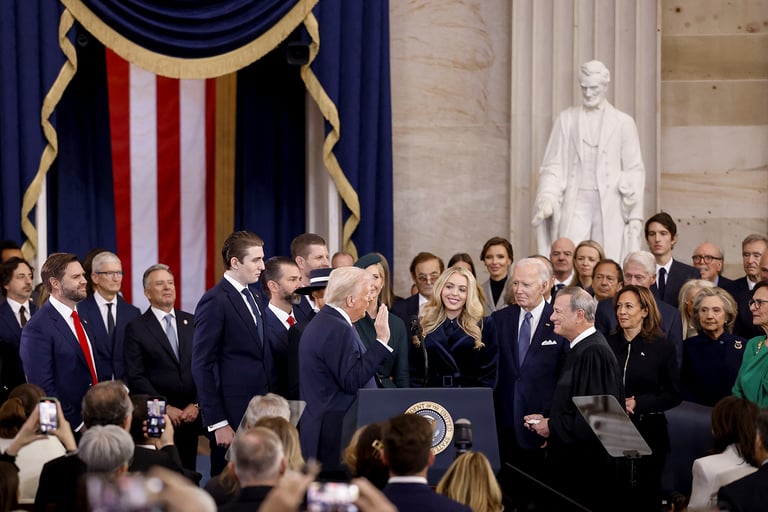

US President Donald Trump's inauguration
